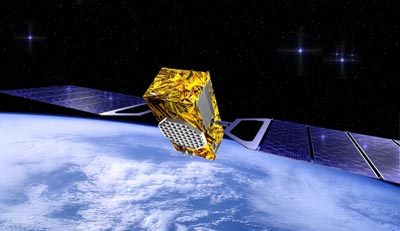What’s the frequency, Jacques?by Taylor Dinerman
|
| The recent agreement between the US and EU has been portrayed as a win-win solution. In fact, it is an almost total victory for the Bush administration. |
American military forces depend on GPS in almost every aspect of their military operations. GPS timing signals are used by almost every communications system in the Pentagon’s inventory. Just a few years ago, France was counting on the so-called “frequency overlay,” to force the US to either jam its own GPS signal in order to deny its use to an enemy or to have to ask permission from a European Commission body in order to conduct military operations anywhere in the world. The frequency overlay would have given the French a sort of a veto over US national security policy.
At first, the US hoped to persuade the Europeans not to build Galileo, but the French were able to make enough of a stink about US interference so as to convince the other European governments to go along. They also agreed to have most of the work for the system done outside France, even while paying the lion’s share of the cost. In typical French fashion, they are willing to surrender their own taxpayers’ and workers’ interests in order to inflict what they hope will be harm on US hyperpuissance.
After the US realized that the Galileo system would probably be built, the Bush administration decided to concentrate on reducing the harm that Galileo could do to GPS. After many long and tough negotiating sessions, the EU agreed to move the quasi-military coded Publicly Regulated Service (PRS) signal to a place on the radio band where it would not interfere with the US plans for a new military signal, called M Code, that will be broadcast by the GPS -3 constellation, to be launched by the US by the end of this decade or thereabouts.
The rest of the agreements have now fallen into place and, in exchange for an essentially meaningless US agreement not to demand a veto over Galileo operations, the Europeans have given in to the US on all major issues. The EU has agreed to move the common signal, which is comparable to the open GPS one used by hikers, truck drivers and the public at large.
| If the public signal can be refined to a one-meter accuracy, then it could become an extremely valuable tool for subsistence farmers in the developing world. |
This is an unalloyed triumph for the Bush Administration and for Colin Powell’s State Department. It shows that sometimes, America’s diplomats are capable of being just as hard-line and as tough as her military. It is to be hoped that this example will be emulated by others in the department, whose reputation for ferociously defending America’s global interests is not quite as stellar as the one the Bureau of Oceans, Environment, and Science has now acquired.
Galileo will probably now go ahead, though the French may lose their enthusiasm for funding it. The idea that European private enterprise will make a legitimate capitalistic investment in the system was never really in the cards. Today, the Europeans are trying to get nations such as China, Israel, and Brazil to join them in building Galileo while, at the same time, promising never to allow these partners access to the militarily useful signals. Over time, it could become a useful adjunct to GPS. If the public signal can be refined to a one-meter accuracy, then it could become an extremely valuable tool for subsistence farmers in the developing world. Of course, this would require the development of simple electronic receiver/mapper/calculators for precision agriculture but, given the demand and the potential of such devices, they will surely be designed and built over the next few years.
In the end, GPS and Galileo could make a serious contribution to the struggle against world hunger, and that would be far more important than France’s effort to inflict some minor harm on America’s global power. Meanwhile, it will be interesting to see how, or if, the Pentagon budgeteers will capitalize on this State Department success by accelerating the development of GPS 3.
